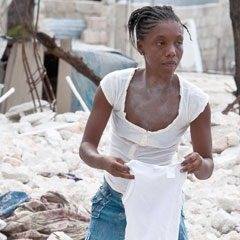
In the tent camps around Port-au-Prince, in the collapsed and desperate slums of Cite Soleil, amid the violence of a chaotic city policed by United Nations troops from around the world there’s a pro-life story.
Kay Famn (Creole for the House of Women) doesn’t call itself a pro-life organization. The Development and Peace partner proudly claims the title feminist. What Kay Famn does, however, lifts up women and the value of life in the face of violence and the most corrosive poverty in the Western Hemisphere.
Before the earthquake Kay Famn ran one of the only women’s shelters in Haiti — a country where until 2005 rape was considered a crime against honour rather than a crime against a person. Now with more than one million people crammed into tent camps where there are no locked doors and the shadows at night hide all kinds of crime, Kay Famn is seeing a steady stream of girls, many between 13 and 15, come to them pregnant.
“They arrive pregnant and give birth here,” Kay Famn co-ordinator Yolette Jeanty told The Catholic Register.
Somebody has to prepare the girls for motherhood.
“They’re kids we are preparing to give birth,” said Jeanty. “They don’t have families. They stay with other kids.”
The program is called Revive. In addition to dealing with the trauma of the girls’ situation — whether they’ve been raped, seduced by an older man or surprised to discover they are pregnant — Kay Famn tries to keep the girls in school or at least provide basic literacy and job training.
If not for Kay Famn, no end of illegal and dangerous abortions are performed in Haiti. Given the state of health care, the girls chances of surviving child birth without Kay Famn are low. Even before the earthquake, the maternal mortality ratio for Haiti was 670 for every 100,000 live births, according to Unicef.
The problem is bigger than Kay Famn can deal with. They’ve got room for about a dozen girls at a time. They can offer financial support for 40 girls. Out there in the camps there’s an epidemic of sexual violence and a kind of brutal economy in which sex is traded for protection, food and shelter.
All of that means there’s good reason to help Kay Famn with financing and strategy, said Development and Peace executive director Michael Casey.
“You look at that tragedy, that kind of thing happening to very young girls, the violence being perpetrated against women in the camps — the stuff that Kay Famn is working with,” he said.
“Those are very, very important stories.”
“There’s a lot of sexual violence against little girls and adolescents,” said Jeanty. “Men are using violence to bring girls to bed. Or trading rice for sex.”
Kay Famn does not advocate for abortion access because that won’t solve Haiti’s problem with sexual violence and predation. They do what they can for the girls who come to them.
“The situation in the camps has exacerbated the problem,” said Jeanty.

